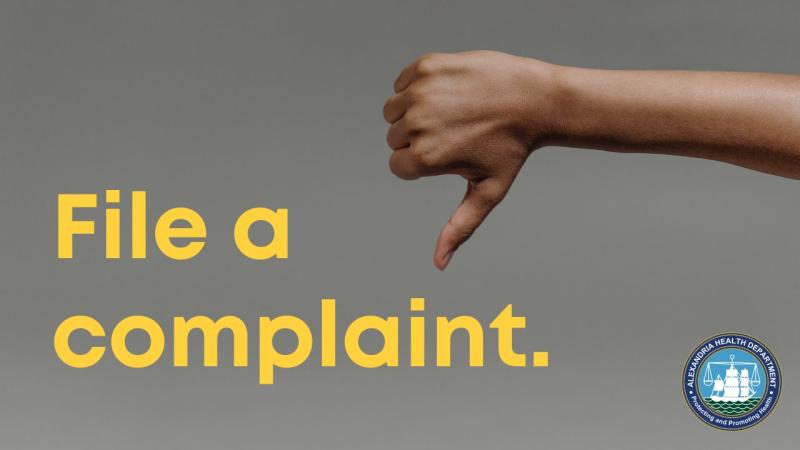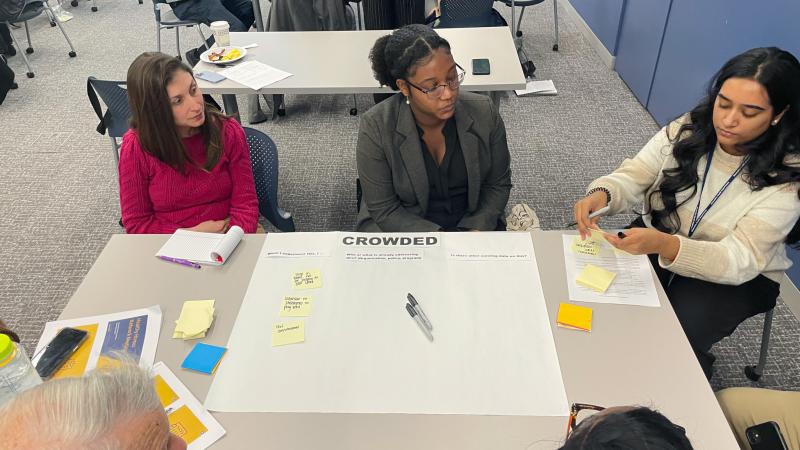Indoor Air Quality - Alexandria, VA
The City of Alexandria offers assistance to improve indoor air quality. View services and information to breathe easier in our City's homes, businesses, schools, and buildings.
Looking for outdoor air quality information? Check out Alexandria's Outdoor Air Quality Website.
Indoor Air Quality in Alexandria: Get Help, Get Involved
Alexandria Indoor Air Hazards - Info & Assistance
From mold to secondhand smoke, substances in the air can make us sick. Learn the basics about these indoor air hazards and see how the City can help you keep your home, business, or indoor space safe.
Many of these hazards, along with dust and pests, can take the form of tiny particles and get into the air. Particles that are smaller than 2.5 micrometers across are called PM2.5 and can cause health problems like heart disease, asthma, and low birth weights.
Mold
Tiny bits of mold can float in the air. When we breathe in the mold, it can make us cough and sneeze or trigger asthma/COPD. Mold can grow anywhere indoors, and it is a big problem in Alexandria, VA.
- Get to know mold - how to find, it, remove it, and stop it from growing.
- What Tenants and Landlords Should Know - Who is Responsible for Mold in Alexandria, VA?
Asbestos
Asbestos is a stringy material that was once used to make lots of building materials like vinyl flooring, ceiling tiles, and insulation. Breathing in asbestos can cause diseases in our lungs or cause cancer in our lungs and other organs.
- Think you may have asbestos in your home? Don't touch it! Learn how to safely handle asbestos. Then, tell your landlord or hire a professional to remove asbestos.
- If you are renovating or demolishing a building in Alexandria, it must be inspected for asbestos. Complete the Alexandria Asbestos Inspection Certification Form.
Need more information on asbestos?
Cigarette & Marijuana Secondhand Smoke
If someone in your home or in your building smokes tobacco or marijuana (weed), small particles of smoke may hang in the air. When you breathe this in, it's called secondhand smoke. Secondhand smoke can trigger breathing issues, asthma, and COPD. In the long term, breathing in secondhand smoke can cause lung cancer, heart disease, and strokes.
- Learn more about secondhand smoke.
- Want to quit smoking or know someone who wants to quit? Visit QuitNow Virginia for help.
- Think someone is smoking in your building?
- If you rent, your building may have a non-smoking policy. You should report your issue to your landlord.
- If you live in a condo building, consider working with your board of directors to develop a non-smoking policy
Lead
Lead is a soft, dense metal used to make many products like dishes, glassware, electronics, and paint. Small bits of lead dust can float in the air. Breathing in lead dust over time can lead to brain damage, high blood pressure, stomach pain, problems having children, and delays in healthy growth.
- Learn more about lead and lead poisoning.
- Think your child may have been exposed to lead? Take them to the doctor and ask for a lead test. If your child has high amounts of lead in their blood, your doctor will notify the health department who can help you address the problem.
- This process is run through Virginia’s Childhood Lead Poisoning Prevention Program.
Carbon Monoxide
Carbon monoxide is an invisible gas. When we breathe in carbon monoxide, we can feel very tired, feel nauseous, or even die. Carbon monoxide alarms can sense carbon monoxide and alert us to leave.
- Learn more about carbon monoxide.
- Get free carbon monoxide alarm installation from Alexandria Fire Department (call the number below).
Alexandria Free Carbon Monoxide Alarm Installation - 703.746.5200
VOCs (Volatile Organic Compounds)
A VOC is a substance that changes from a liquid to a gas very easily. In our homes, VOCs can come from burning gas or oil, spraying cleaning products, or smoking. Even though they can be hard to see or smell, VOCs in the air can make us sick. In the long term, breathing in VOCs can cause cancer.
- Learn about VOCs.
- Learn to make cough-free cleaning supplies with household objects.
- VOCs can come from appliances that burn gas like natural gas stoves and natural gas heaters or water heaters. Consider switching to electric appliances to reduce VOCs and learn how you can offset the cost with government tax credits and rebates at Energy.gov.


